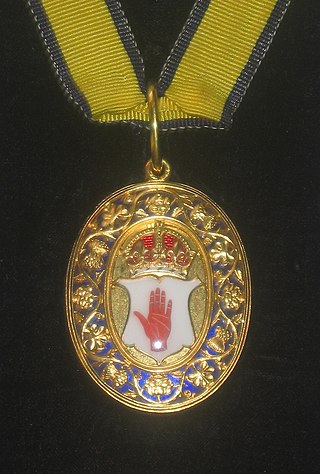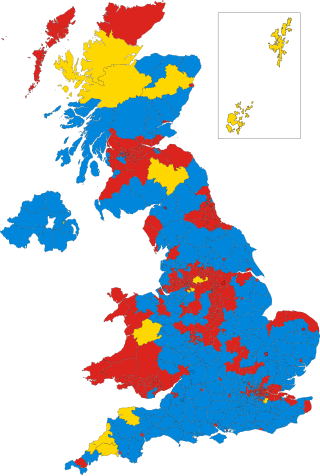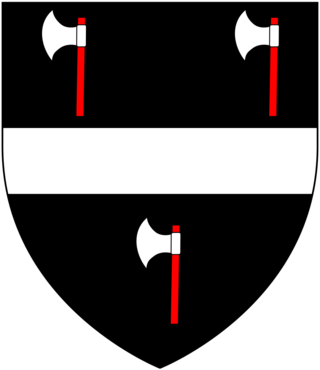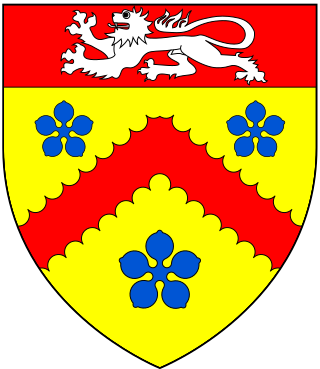
A baronet or the female equivalent, a baronetess, is the holder of a baronetcy, a hereditary title awarded by the British Crown. The title of baronet is mentioned as early as the 14th century; however, in its current usage it was created by James I of England in 1611 as a means of raising funds for the crown.

The 1966 United Kingdom general election was held on Thursday 31 March 1966. The result was a landslide victory for the Labour Party led by incumbent Prime Minister Harold Wilson.
The Peerage of England comprises all peerages created in the Kingdom of England before the Act of Union in 1707. In that year, the Peerages of England and Scotland were replaced by one Peerage of Great Britain. There are five peerages in the United Kingdom in total.

Earl Waldegrave is a title in the Peerage of Great Britain. It was created in 1729 for James Waldegrave, 2nd Baron Waldegrave.

Earl of Rosslyn is a title in the Peerage of the United Kingdom. It was created in 1801 for Alexander Wedderburn, 1st Baron Loughborough, Lord Chancellor from 1793 to 1801, with special remainder to his nephew Sir James St Clair-Erskine, as Wedderburn had no surviving issue of his own. Wedderburn had already been created Baron Loughborough, of Loughborough in the County of Leicester, in the Peerage of Great Britain in 1780, with normal remainder to the heirs male of his body, and Baron Loughborough, of Loughborough in the County of Surrey, in the Peerage of Great Britain in 1795, with the same remainder as the earldom. The 1780 barony became extinct upon his death, but the 1795 barony and the earldom passed, by the special remainder, to his nephew, who thus became the second Earl of Rosslyn. The second Earl was a Lieutenant-General in the Army and also held political office as Lord Privy Seal and Lord President of the Council.

Earl of Rosse is a title that has been created twice in the Peerage of Ireland, both times for the Parsons family. "Rosse" refers to New Ross in County Wexford.
Earl of Bradford is a title that has been created twice, once in the Peerage of England and once in the Peerage of the United Kingdom. It was first created in 1694 for Francis Newport, 2nd Baron Newport. However, all the Newport titles became extinct on the death of the fourth Earl in 1762. The earldom was revived in 1815 for Orlando Bridgeman, 2nd Baron Bradford. The Bridgeman family had previously succeeded to the Newport estates. The title of the peerage refers to the ancient hundred of Bradford in Shropshire, and not, as might be assumed, to the city of Bradford, Yorkshire, or the town of Bradford-on-Avon in Wiltshire.

Earl of Cottenham, of Cottenham in the County of Cambridge, is a title in the Peerage of the United Kingdom. It was created in 1850 for the prominent lawyer and Whig politician Charles Pepys, 1st Baron Cottenham. ) He served as Lord Chancellor from 1836 to 1841 and from 1846 to 1850. Pepys had already been created Baron Cottenham, of Cottenham in the County of Cambridge, in 1836, and was made Viscount Crowhurst, of Crowhurst in the County of Surrey, at the same time he was given the earldom. These titles are also in the Peerage of the United Kingdom. The viscountcy is used as a courtesy title for the Earl's eldest son and heir apparent.

Baron Hazlerigg, of Noseley in the County of Leicester, is a title in the Peerage of the United Kingdom. It was created in 1945 for Sir Arthur Hazlerigg, 13th Baronet. He had previously served as Lord Lieutenant of Leicestershire. As of 2023 the title is held by his great-grandson, the fourth Baron, who succeeded his father in 2022.
Baron Denham, of Weston Underwood in the County of Buckingham, is a title in the Peerage of the United Kingdom. It was created in 1937 for Sir George Bowyer, 1st Baronet, a Conservative politician who had earlier represented Buckingham in the House of Commons. He had already been created a baronet, of Weston Underwood, in 1933. Bowyer was a great-great-great-grandson of Sir William Bowyer, 3rd Baronet, of Denham Court. As of 2017 the titles are held by his second but only surviving son, the 2nd Baron, who succeeded in 1948. In 1950 he also succeeded his distant relative in the Bowyer baronetcy, of Denham Court. Like his father, the 2nd Baron Denham was a Conservative politician and one of the ninety elected hereditary peers that remain in the House of Lords after the passing of the House of Lords Act 1999.
Baron Acton, of Aldenham in the County of Shropshire, is a title in the Peerage of the United Kingdom. It was created on 11 December 1869 for Sir John Dalberg-Acton, 8th Baronet, a prominent historian and Liberal Member of Parliament.

Baron Poltimore, of Poltimore in the County of Devon, is a title in the Peerage of the United Kingdom. It was created in 1831 for Sir George Bampfylde, 6th Baronet. His son, the second Baron, held office as Treasurer of the Household from 1872 to 1874 in the first Liberal administration of William Ewart Gladstone.

Sir John Eardley Eardley-Wilmot, 1st Baronet was a politician in the United Kingdom who served as Member of Parliament (MP) for North Warwickshire and then as Lieutenant-Governor of Van Diemen's Land.

Clan Macdonald of Sleat, sometimes known as Clan Donald North and in Gaelic Clann Ùisdein, is a Scottish clan and a branch of Clan Donald—one of the largest Scottish clans. The founder of the Macdonalds of Sleat was Ùisdean, or Hugh, a 6th great-grandson of Somerled, a 12th-century Lord of the Isles. The clan is known in Gaelic as Clann Ùisdein, and its chief's Gaelic designation is Mac Ùisdein, in reference to the clan's founder. Both the clan and its clan chief are recognised by the Lord Lyon King of Arms, who is the heraldic authority in Scotland.

The Wrey Baronetcy, of Trebitch in the County of Cornwall, is a title in the Baronetage of England. It was created on 30 June 1628 for William Wrey (d.1636), 2nd son of John Wrey of Trebeigh, St Ive, Cornwall, a member of an ancient Devon family. The third Baronet was a supporter of the Royalist cause and sat as Member of Parliament for Lostwithiel after the Restoration. He married Lady Anne, third daughter and co-heir of Edward Bourchier, 4th Earl of Bath, and a co-heir to the barony of Fitzwarine. The fourth Baronet represented Liskeard and Devon in the House of Commons. The fifth Baronet was Member of Parliament for Camelford while the sixth Baronet represented Barnstaple.

Tawstock is a village, civil parish and former manor in North Devon in the English county of Devon, England. The parish is surrounded clockwise from the north by the parishes of Barnstaple, Bishop's Tawton, Atherington, Yarnscombe, Horwood, Lovacott and Newton Tracey and Fremington. In 2001 it had a population of 2,093. The estimated population in June 2019 was 2,372.

There have been three baronetcies created for persons with the surname Cooke, two in the Baronetage of England and one in the Baronetage of Ireland. One creation is extant as of 2013.

The Campbell of Auchinbreck family was founded by Duncan Campbell in Glassary, Argyll, Scotland. He was the son of Lord Duncan Campbell, first Lord Campbell of the Clan Campbell, by his second wife Margaret, daughter of Sir John Stewart of Blackhall, the illegitimate son of King Robert III of Scotland. The family of the Lords Campbell later became Dukes of Argyll, and remain chiefs of Clan Campbell. Duncan Campbell, as a grandson of King Robert III, received a considerable estate confirmed by royal charter dated 19 June 1452. The family remained at their estate of Auchinbreck, from which they took their title, until 1641. The Campbells of Auchinbreck were commissioned to provide military training and were used by the Earls of Argyll as military support. In 1628 the then head of the family of Campbells in Auchinbreck received a baronetcy, which included a grant of North American land in Nova Scotia.
Sir John Perring, 1st Baronet, FSA, of Membland in the parish of Holbeton, Devon, was a Member of Parliament and served as Lord Mayor of London in 1803. He was a commissioner for exchequer bills and senior partner of the banking firm John Perring, Shaw, Barber & Co., which having suffered in the Panic of 1825, resulted in Perring losing his estates. On 3 October 1808 he was created a baronet, first of the Perring baronets of Membland, Devon.